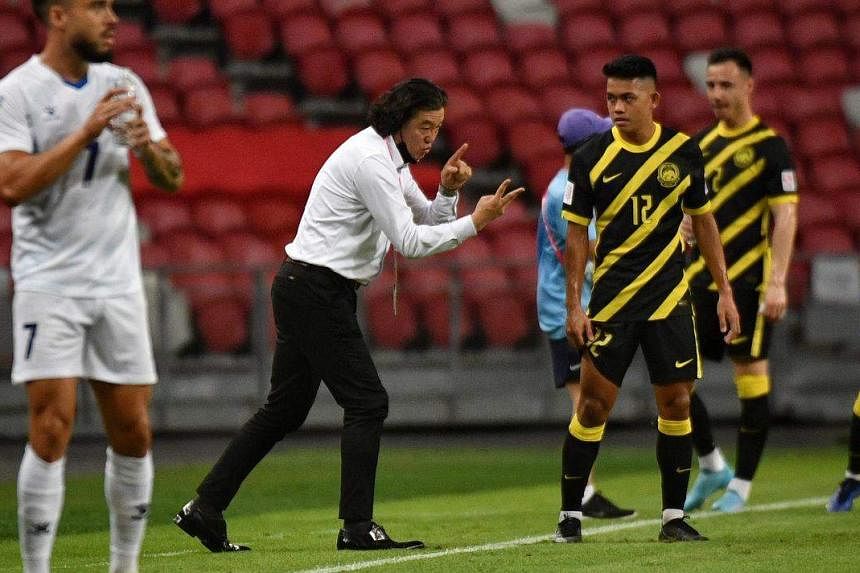SINGAPORE – There are always fireworks at a Causeway derby between Singapore and Malaysia, but last Tuesday’s encounter at the Asean Football Federation Championship also reflected a contrast in football fortunes for both teams.
At the final whistle, the Tigers and their fans among the 65.147-strong crowd at Bukit Jalil stadium were roaring after a 4-1 win – their first against Singapore at home in the AFF Championship – while the Lions exited the tournament with a whimper.
Malaysia are now one step from the final after defeating six-time champions Thailand 1-0 in the first-leg semi-final in Kuala Lumpur on Saturday, and will travel to Bangkok for the second leg on Tuesday.
With the wins coming on the back of their first Asian Cup qualification since 1980, how did Malaysia turn things around from the low of 2015, when they lost 10-0 to the United Arab Emirates in a World Cup qualifier?
Breeding the Harimau Muda
Aimed at developing young Malaysian footballers, the Young Tigers were founded in 2007 and mostly comprised emerging players from the Bukit Jalil Sports School and Under-21 players from state teams.
While they were almost dissolved after finishing eighth in the second-tier Malaysia Premier League, they made full use of a reprieve to win the title in 2009, and added back-to-back SEA Games gold medals in 2009 and 2011. To avoid league and international schedule conflict, B and C teams were formed.
Their A team went to play in the Slovak First League in 2010, which former Hougang United coach Clement Teo felt was Malaysia football’s turning point.
He said: “It is no secret that football in this region is not as intense as it is in Europe, and the young Malaysians were exposed to faster and more physical competition, and they benefited immensely from that.”
However, New Straits Times reporter K. Rajan called it a false dawn, as all three teams closed in 2015 and players were released back to clubs.
He said: “After some initial success, many of the players could not reach their full potential. They returned to play in the Malaysia Super League and failed to make an impact and the national team did not make a further step up after that.”
Super club Johor DT
In 2012, the Crown Prince of Johor (TMJ) Tunku Ismail Sultan Ibrahim was appointed president of the state’s football association and swiftly moved to revamp Johor football.
His bottomless pockets meant no resources were spared to improve Johor Darul Takzim’s (JDT) players, backroom staff and facilities. Lured by bumper five-figure monthly salaries, the best local players were amassed by the super club, as they became teammates with foreign stars such as Argentina’s Pablo Aimar and Dani Guiza.
As a result, JDT have won nine consecutive MSL titles since 2014, won Asia’s second-tier AFC Cup in 2015 before making it to the round of 16 in the top-tier AFC Champions League in 2022.
They also have three other teams in the lower divisions for a solid development pipeline.
Rajan said: “With TMJ investing significant money and resources, JDT have played their part in raising the standard and prestige of football in Malaysia, with the only issue being the uneven playing field compared to the other clubs.”
Privatisation
Indeed, with many other Malaysian teams predominantly funded by the respective states, there was a limit to the players they could attract.
Privatisation was mooted as the solution to create professional and commercially viable clubs, and the Football Malaysia Limited Liability Partnership was created in 2015 to own and operate the top two tiers. By the end of 2020, all clubs had completed the initial privatisation process.
Stuart Ramalingam, Football Association of Malaysia’s general secretary from 2018 to 2021 and now CEO of the Malaysian Football League, told Nikkei Asia: “This exercise is to unchain local football from governments as the plug of funding from government can be pulled at any time.
“State involvement in a private club is not wrong in itself. It is the mismanagement we have to avoid. We need accountability, transparency and responsibility and this will attract outside investment.”
JDT technical director Alistair Edwards felt that privatisation would spur clubs to be more enterprising and move away from a “handout mentality”, adding that “we need professionals to be involved in running clubs and not politicians”.
Naturalisation of players
After losing a World Cup qualifier to Singapore in 2011, then Malaysia captain Safiq Rahim reportedly said the Lions were very reliant on their naturalised players and not much of a team without them.
More than a decade on, the tables have turned. Since 2013, the side have actively recruited foreign-born players to widen their talent pool.
During training, the usual smattering of Malay chatter has been replaced by banter with heavy English and Australian accents, and in their drubbing of Singapore, all three scorers – Darren Lok, Stuart Wilkin (both England) and Sergio Aguero (Argentina) – are foreign-born.
In their current AFF Championship squad, six have Malaysian heritage, while England-born Lee Tuck and Aguero were naturalised without any Malaysian ties. The advantage of players with local heritage is they do not have to fulfil the five-year residency rule to switch nationalities and have a longer runway in the national team.
With a host of first-choice national players withdrawing from the squad, they actually have at least a dozen other foreign-born Tigers waiting in the wings.
Former Malaysia coach B. Sathianathan told The New Straits Times: “These naturalised players will bring back interest in the national team. When you have negative results, it does little to boost football.”
Finding the right coach
Malaysia have not cracked the world’s top 140 national teams in the past decade, and even slipped to their worst ranking of 178th in 2018. The Harimau Malaya are now 145th, 15 spots above the Lions.
Rajan felt that while the talent pool has increased in recent years, it has not yielded an end product.
He noted: “FAM decided to go for foreign coaches as local coaches struggled after initial success.
“Now, they have found a good candidate in Kim Pan-gon because he seems to have improved from his stint with Hong Kong, done his homework and quickly adapted to the Malaysia style while implementing his own ideas and philosophy of proactive football.”
Kim has the statistics to back him up. Since taking over in 2022, the 53-year-old has led Malaysia to 10 wins and three draws in 15 games, which is an unprecedented record for coaches who have been in charge of more than 10 matches.

New dawn?
The wheels look to be in motion for a Malaysia football resurgence, with a multi-pronged approach to fix issues simultaneously.
In 2014, the National Football Development Programme, a long-term plan to raise Malaysia football levels, promote and develop the sport nationally, was launched.
It was intended to have two phases from 2014 to 2020 and 2021 to 2030 focused on increasing participation and competition for young players, improving coaching and facilities, and developing the ecosystem, among others.
Later on, another F:30 road map was launched in 2018 with the aim of propelling Malaysia, now 25th on the continent, into Asia’s top five by 2030.
But with Malaysia hitting setbacks previously, Rajan remained cautious, saying: “The lows we went through were the much-needed wake-up call, but it birthed something great, which is football activism, as fans became more organised and vocal in demanding changes, and kudos to FAM for waking up and trying to fix things. It took ownership of the failures and football culture is starting to thrive again here.
“But hold your horses, for the jury is still out on whether this is a new or false dawn. Malaysia football is still very fragile at the moment as it goes through a reset. Any mis-step, and we can crash again.”


